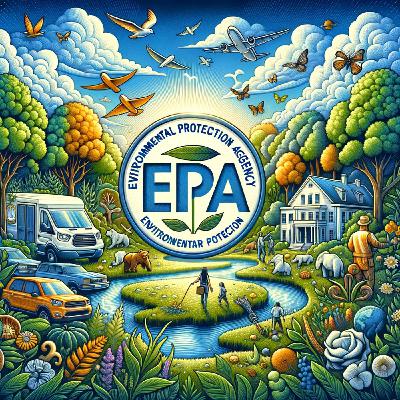EPA's Sweeping Climate Rollbacks and the Battle Over PFAS Regulations
Update: 2025-09-12
Description
Thanks for joining us for another episode covering the latest from the U.S. Environmental Protection Agency. This week, the headline everyone’s talking about is the EPA’s sweeping move to roll back greenhouse gas standards for fossil fuel-fired power plants and vehicles—a shift that experts say could reshape federal climate policy for years to come. The proposed repeals, put forth on June 17 and July 29, target both the Obama- and Biden-era carbon emissions controls and challenge the foundational “Endangerment Finding” that underpins federal greenhouse gas regulation. According to EPA Administrator Michael Regan, the agency’s reinterpretation of the Clean Air Act means fossil fuel plants and many vehicles might no longer be regulated as significant sources of climate pollution. The ripple effect is already being felt: environmental advocates warn of legal fights ahead, while many utilities and manufacturers face new uncertainty in planning investments. The EPA claims this approach provides “regulatory clarity,” but state leaders like California’s governor argue it risks undercutting decades of progress in air quality and public health protections.
Meanwhile, the EPA’s Spring 2025 regulatory agenda lays out major initiatives beyond climate. The agency is placing a sharp focus on PFAS—those so-called “forever chemicals”—with proposals to rescind drinking water limits for several PFAS types like PFHxS and GenX, add more PFAS chemicals to the Toxics Release Inventory, and tighten reporting requirements nationwide. The deadlines are looming, with proposed PFAS rulemakings expected as soon as September and new discharge standards rolling out into 2026. According to the EPA’s own data, millions of Americans have detectable PFAS in their water, so communities and water utilities are watching how these shifts could affect local safety standards and the costs of compliance.
There’s more: the EPA is finalizing risk management rules for chemicals like 1-bromopropane and launching updates on lithium battery disposal standards. For industry, these actions mean potential new investments in compliance—and potential liability for past emissions or hazardous waste management. For everyday citizens, it’s about the air you breathe and the water you drink. EPA officials say their new universal waste standards for solar panels and batteries are meant to modernize recycling and protect communities from toxic materials as clean energy technologies expand.
Budget allocations remain under scrutiny, with some programs seeing increases in response to Congress’s renewed focus on chemical safety and emergency response. There are also signs of greater collaboration, as EPA steps up joint regulatory efforts with states on pollution monitoring and reporting.
If you’re wondering what’s next, keep your eye on the EPA’s final rules for greenhouse gas standards—expected by December—and upcoming deadlines for public comment on PFAS policies. The agency has set up online portals for citizen feedback and public hearings are in the works, especially for communities directly affected by chemical contamination.
If you’d like to learn more or want to get involved, head to the EPA’s website for regulatory dockets and comment opportunities. Your voice can help shape how these decisions impact everything from local jobs to environmental health.
Thanks for tuning in. Subscribe to catch next week’s deep dive on environmental policy, and don’t forget—this has been a Quiet Please production, for more check out quiet please dot ai.
For more http://www.quietplease.ai
Get the best deals https://amzn.to/3ODvOta
This content was created in partnership and with the help of Artificial Intelligence AI
Meanwhile, the EPA’s Spring 2025 regulatory agenda lays out major initiatives beyond climate. The agency is placing a sharp focus on PFAS—those so-called “forever chemicals”—with proposals to rescind drinking water limits for several PFAS types like PFHxS and GenX, add more PFAS chemicals to the Toxics Release Inventory, and tighten reporting requirements nationwide. The deadlines are looming, with proposed PFAS rulemakings expected as soon as September and new discharge standards rolling out into 2026. According to the EPA’s own data, millions of Americans have detectable PFAS in their water, so communities and water utilities are watching how these shifts could affect local safety standards and the costs of compliance.
There’s more: the EPA is finalizing risk management rules for chemicals like 1-bromopropane and launching updates on lithium battery disposal standards. For industry, these actions mean potential new investments in compliance—and potential liability for past emissions or hazardous waste management. For everyday citizens, it’s about the air you breathe and the water you drink. EPA officials say their new universal waste standards for solar panels and batteries are meant to modernize recycling and protect communities from toxic materials as clean energy technologies expand.
Budget allocations remain under scrutiny, with some programs seeing increases in response to Congress’s renewed focus on chemical safety and emergency response. There are also signs of greater collaboration, as EPA steps up joint regulatory efforts with states on pollution monitoring and reporting.
If you’re wondering what’s next, keep your eye on the EPA’s final rules for greenhouse gas standards—expected by December—and upcoming deadlines for public comment on PFAS policies. The agency has set up online portals for citizen feedback and public hearings are in the works, especially for communities directly affected by chemical contamination.
If you’d like to learn more or want to get involved, head to the EPA’s website for regulatory dockets and comment opportunities. Your voice can help shape how these decisions impact everything from local jobs to environmental health.
Thanks for tuning in. Subscribe to catch next week’s deep dive on environmental policy, and don’t forget—this has been a Quiet Please production, for more check out quiet please dot ai.
For more http://www.quietplease.ai
Get the best deals https://amzn.to/3ODvOta
This content was created in partnership and with the help of Artificial Intelligence AI
Comments
In Channel





